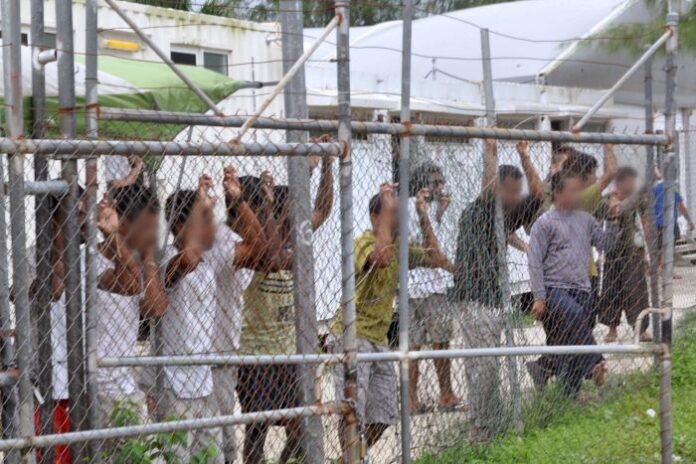The humanitarian crisis on Manus Island has reached new proportions. Since the federal election in May, more than 50 refugees are reported to have self-harmed or attempted suicide, including setting themselves on fire.
Some of those stranded on Manus had hoped that if the Labor Party was elected, there was a chance that an end to their imprisonment was in reach. Labor had said they would take New Zealand up on their offer to accept a small number of refugees.
With no end to their detention in sight, the men on Manus are now increasingly desperate and their mental and physical health has severely deteriorated. The facilities on the island are not able to keep up with the worsening situation, with even the governor and police chief of Manus sounding the alarm.
With the hope of going to New Zealand now extinguished, the refugees are increasingly finding life unbearable. The increase in suicide attempts is a further indictment on the Coalition’s cruel policy of mandatory indefinite offshore detention.
At the end of May, a boat carrying Sri Lankan asylum seekers was intercepted by the Australian Navy. These asylum seekers, who had fled the country not long after the terrorist attacks in April, were sent back to Sri Lanka where their lives are now in danger.
This policy of “turning back the boats” not only breaches international laws, but is plainly inhumane. Unfortunately, Labor also support this policy and despite the illusions that some have in them, they are really no better than the Coalition when it comes to refugee rights.
It’s worth remembering that Labor re-started offshore processing in 2012 and excised the mainland from the migration zone the same year. Labor supports the policy of mandatory detention, and post-election they seem to be trying to present themselves as even more hard-line than the Coalition.
Kristina Kenneally, the newly appointed Shadow Minister for Immigration and Citizenship, has already reversed her opposition to turning back the boats. She’s now trying to compete with Peter Dutton on border control by pointing out the number of asylum seekers who arrive by plane.
Kenneally’s cowardly backpedalling follows the silence of other Labor politicians such as Ged Kearney, who campaigned for office on her supposed support for refugee rights, but once in parliament has remained silent.
It’s clear that the refugee rights movement cannot rely on any sort of ‘vote Labor’ strategy. A movement needs to be built to put pressure on the powers-that-be – including the major parties – but it can’t restrict itself to merely appealing to people’s sense of morality.
While most of the population is generally sympathetic towards refugees, this can change on the basis of an economic downturn. Feeling under pressure, people can become more open to the idea that there is not enough to go around and that we need to reduce immigration. Refugees can be used as a convenient scapegoat for problems created by capitalism.
With this in mind the refugee movement must go beyond moralism and address these economic issues. For example, it is greedy employers who are sacking people and cutting hours, and the big banks, landlords and developers who are to blame for the housing crisis.
The ongoing lack of investment in public housing, health, education and transport are decisions made by the government. They do this while giving big business tax breaks. No refugee is responsible for the huge gap that exists between rich and poor in Australia.
In addition to improved rights for refugees, the movement must demand real investment in jobs, homes and services for all. We must explain that there is plenty of wealth being created. The issue is that it’s being controlled by a rich few and there is no democratic oversight about how its distributed.
Socialist policies, designed to do away with wealth inequality, could free up billions of dollars and improve the lives of all, including refugees. At the same time, the billions wasted on offshore detention could be spent on expanding services and settling refugees safely in the community.
On the basis of a different way of running society, the tiny minority who hoard the wealth we produce would not be in a position to impose their inhumane policies. A socialist society would raise everybody’s standard of living and there would be no need to scapegoat those fleeing war and persecution, let alone lock them up on island prisons.



